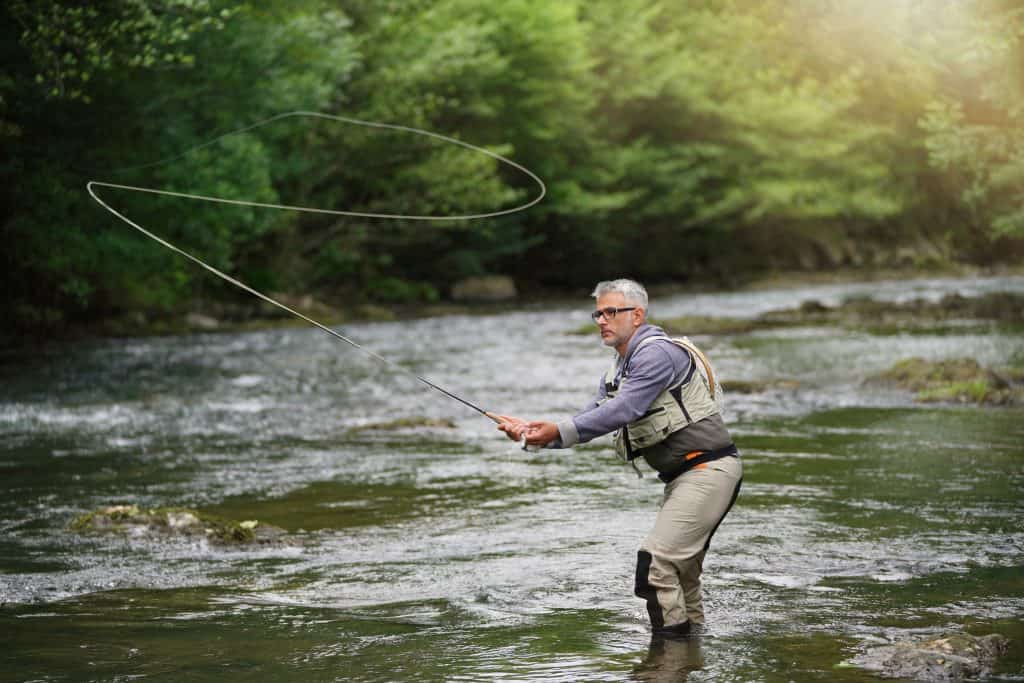
There is a common question in the fishing community regarding the attitudes and “snobbishness” of fly fishermen. This common confusion led me to seek some answers to this fly fishing “myth” and to share what I found here with you.
So, why are fly fishermen such snobs? Assuming all fly fishermen are snobs is a large generalization. There are some “snobs” who do participate in fly fishing, but there are inevitably some who also participate in other activities. We do not often hear “Why do all snobs ride bikes?” or “Why are all pet owners snobby?” These questions are too much of a generalization to be measurable.
This now leads us to the question of why are fly fishermen assumed to be snobs? Is there something about the sport that leads others to believe that fly fishermen act in a way that places themselves “above others”?
To find out more on these questions and some of the ways I can prove not all fly fishermen are snobs, continue reading below.
Fly Fishermen Snobbery: Fact or Fiction?
Growing up in Montana, there was plenty of time for fishing. In fact, I too was guilty of having the idea in my mind that fly fishermen were in some way, shape, or form, “better” than the other fishermen out on the river.
While some may see this as snobbery, I only had that thought because those who fly
Each of the fly fishermen I saw was always by themselves or a few hundred feet away from their companion. This just gave them an air of “power” to my young, impressionable mind.
I, too, was guilty of having the idea in my mind that fly fishermen were in some way, shape, or form, “better” than the other fishermen.
Watching them continually cast led me to believe that they were in fact much better than I was when it came to fishing (mostly because every time my line was stuck on a tree or a snagged underwater, I would look over and see the fly fishermen were still just patiently casting).
As I aged this “awe” I had for fly fishermen may have become slightly resentful. However, this was more of simple jealousy for their skill and patience, not resentment for who they were.
I believe that the “fly fishermen snobbery” is fiction and stems somewhat from the awe that I experienced growing up.
While searching to find out the truth on fly fishermen, I found that many fishermen feel as though when fishing near a fly fisherman, that the fly fisherman will “turn his nose up at them.” Which I just do not know if I can prove to be true or not.
Perhaps this “turning” of their noses is seen in the quiet demeanor of the fly fishermen. This quiet however, I believe is not an effort to look down upon normal spin fishermen but rather just a fly fisherman seeking the peace that can be found when out on the river and the patience of catching a fish.
Fly fishing gear can be much more expensive than normal fishing gear and therefore can make fly fishermen appear a bit more “uppity” or “snobbish.” This leads them to take better care (hopefully) of their gear and may once again leave other thinking they have been “one-upped.”
The most prominent response to the question of fly fishermen snobbery is simply that, any experienced fisherman will express a slight “disgust” or anger with someone of lesser experience.
Not because they are at a lower level, but because those with less experience have yet to gain the respect for nature that many experienced fishermen have.
These less experienced fishermen may crowd a fishing spot previously occupied by another fisherman, or they may leave garbage or broken lines skewed across the area.
Since most inexperienced fishermen begin learning on a normal spin rod, the spin fishermen have developed a bad name and are, therefore “looked down upon” by other types of fishermen. Not because they are better but because they have greater respect for the care of the waters they have come to love.
Not all fly fishermen are snobs!
On the flip side, while digging through some response boards to get the inside scoop on this fishing story, I did find some sarcastic remarks from people who appeared to be “real fly fishermen” (after all who can really tell on the internet these days) saying that fly fishermen are simply better than others.
These remarks from only a small number of fly fishermen are the exact kind of behavior that gives all fly fishermen the bad reputation. Just in the same way that spin rod fishermen who leave garbage, make too much noise, and crowd someone else’s line have given all spin fishermen a negative name as well.
Disrespectful, inexperienced fishermen can give the whole sport a bad name.
Fly Fishing Making a Difference

If you need more proof that fly fishermen are, in fact, not all snobs. I have found irrefutable evidence to support my claim.
As many fishermen have realized, being out on the river and in nature can bring a sense of peace and relieve some of the stress from daily life.
Fly fishermen (among many others) have especially recognized this healing nature of the waters and have taken the task upon themselves to bring that healing to those who truly need it.
For example, Project Healing Waters is an organization that aids in the physical and emotional rehabilitation of disabled miliatary personel and veterans. Project Healing Waters does this through teaching these people to fly fish and to truly enjoy the beauty that comes with nature.
Project Healing Water operates solely on donations from the community and from other fly fishermen hoping to help make a difference.
In fact, Project Healing Waters has a location just a few hours away from where I lived in Montana and has always had a good reputation among the people in the area.
In Virginia each year the Legend of the Fly fishing tournament opens their applications to not only competitors with the ability to pay but offers free admittance to members who have participated in Project Healing Waters.
This encourages the participants to seek out fly fishing in a new way and to have new, beneficial experiences in life.
Another organization with a similar task to Project Healing Waters is called Casting for Recovery.
Casting for Recovery is another organization that offers fly fishing lessons and excursions to those who truly need it, free of charge. However, rather than focusing on military personell, Casting for Recovery works with women who are fighting or who have fought breast cancer.
The goal of this organization is to bring women, in any stage of cancer, together in nature to bring them healing and peace through their condition.
After all of this, I believe that I can say I have made an irrefutably clear argument that while some people have given many a bad name, not all fly fishermen are snobs and many aim to bring the love of their sport to others in a unique and healing way.
Related Questions
What are the benefits of fly fishing? Fly fishing can challenge your brain, relieve stress, bring you closer to nature, and help you develop a life long skill (just to list a couple).
Which is better, fly fishing or spin fishing? Both provide an excellent way to become more active in nature and offer a fairly challenging skill that benefits you in more ways than one can count. So… both!
